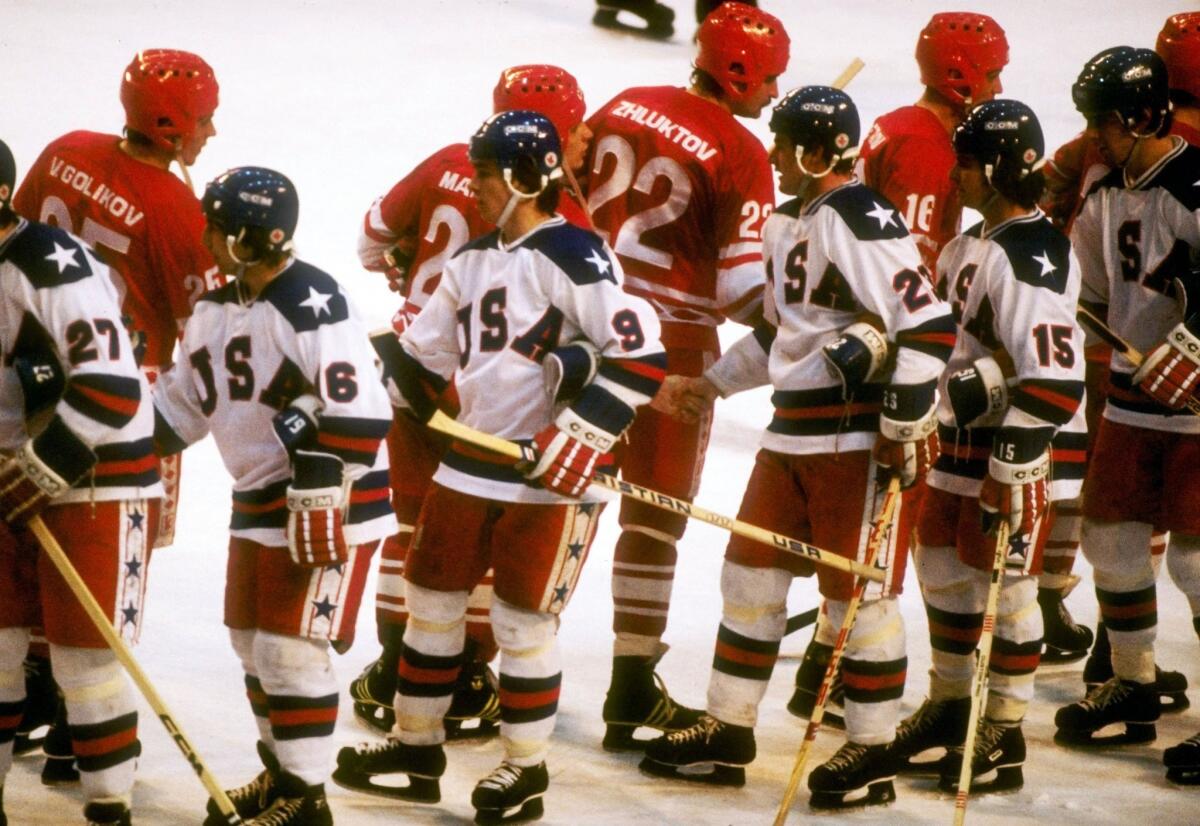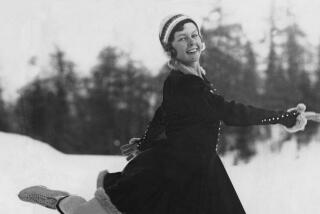For U.S. and Russia Olympians, the Cold War is ancient history

- Share via
SOCHI, Russia — The conversation was short, limited to basic words and gestures. But the two bobsledders — one Russian, one American — understood each other.
“Was good?” Alexander Kasjanov asked, pointing toward the track at the Sanki Sliding Center.
U.S. pilot Steven Holcomb slung an arm around his competitor’s shoulder as they walked back toward their sleds. As Holcomb had explained earlier: “We all get along.”
Most of the athletes at these 2014 Sochi Olympics are a generation removed from Cold War tensions that once fueled an intense rivalry between Russians and Americans.
Most of them were born after the U.S. hockey team’s Miracle on Ice victory over the Soviet Union in 1980. And long after the controversial basketball final at the 1972 Munich Games.
When the nations face each other in men’s hockey on Saturday afternoon, it will feel like a matchup between two highly regarded squads and not so much like a geopolitical struggle.
“The Russians are not the ‘evil empire’ anymore,” said Mark Dyreson, an Olympic historian at Penn State University. “That’s truly ancient history to this generation.”
The long, uneasy relationship between the U.S. and the Soviet Union began spilling over to the sports world in the early 1950s when the Soviets — and East Germans — increased their focus on state-run athletic programs as a form of propaganda.
The Soviets filled their rosters with veterans paid to play for clubs and the military, which sparked resentment among U.S. squads that relied primarily on college talent. The Americans also disliked losing.
For better or worse, the medals race between the dueling superpowers became a subtext to the Games.
“The Soviet Union saw the Olympics as a way of demonstrating its superiority,” said David Wallechinsky, author of “The Complete Book of the Olympics.” “For them, it was all about medals.”
The competition produced one flash point after another.
At the 1952 Helsinki Games, Horace Ashenfelter upset favorite Vladimir Kazantsev in the steeplechase and the American media made a big deal of an FBI agent outracing a Soviet.
Twenty years later, the Soviets won that gold-medal basketball game marked by coaches charging onto the court, officials arguing and the Americans celebrating an apparent victory only to have three seconds put back on the clock.
The hockey victory in Lake Placid, N.Y., made household names of the previously unknown Mike Eruzione and Jim Craig, their exploits inspiring not one but two Hollywood movies.
Dmitry Chernyshenko, head of the Sochi organizing committee, said on Friday that he recalls three horror films from his youth: “Friday the 13th,” “A Nightmare on Elm Street” and “Miracle on Ice.”
“We all grew up in the culture that hockey is a religion in our country,” Chernyshenko said. “And we were educated by this very dramatic story of the competition between our two great countries.”
But when asked about the benchmark victory, Kings and U.S. goalie Jonathan Quick offered a different answer: “That game was 34 years ago.”
The low point in the rivalry came when the U.S. boycotted the Moscow Games in 1980 to protest the Soviet invasion of Afghanistan and the Russians reciprocated by withdrawing from the 1984 Los Angeles Games.
The dissolution of the U.S.S.R. in the early 1990s finally cooled things off by calming the political climate and fragmenting Russia’s talent pool for sports.
Top athletes that might have represented the Soviet Union subsequently competed for Belarus, Latvia and Estonia, among other countries. The Russians were no longer sequestered.
They became free to compete around the world and visit American facilities to hone their skills.
“We do share training sites, we do share coaches,” U.S. ice dancer Alex Shibutani said. “We get to know these people. It’s first-name basis, it’s not, ‘Oh, the Russians.’”
The NHL turned international years ago, with the likes of Alexander Ovechkin, Pavel Datsyuk and the Kings’ Slava Voynov among dozens of players currently in the league.
Americans say they have benefited from exposure to Russia’s pass-oriented style. Vladislav Tretiak, the legendary goalie, credits the Lake Placid loss for making his countrymen mentally stronger.
“In 1980, it was a good lesson that the Americans taught us,” he said this week. “We did not have respect for competitors at that time, and that’s why we lost. But we don’t have that during this Olympics.”
The once-icy relationship has thawed to such a degree that, earlier this week, the French publication L’Equipe quoted an unnamed source alleging that the U.S. and Russia were colluding to fix the figure-skating results in Sochi.
Olympic officials quickly dismissed the report as false.
Halfway through these Olympics, it seems that athletic camaraderie has trumped any rift that separates the two countries.
The hockey players insist that Saturday’s game is all about sports and the sliders talk about spending months together on the World Cup circuit, staying in the same hotels and eating at the same restaurants.
The language barrier often gives way to shared interests in drinking beer and playing table tennis.
U.S. luge racer Erin Hamlin recently persuaded several Russian competitors to shimmy and lip sync in a campy video that she and teammate Kate Hansen made to Mariah Carey’s “All I Want for Christmas Is You.”
Hamlin has been competing alongside the Russian team since she was 15, a personal experience that outweighs any political history.
“I’ve basically grown up with them,” she said. “It’s a pretty cool relationship.”
Twitter: @LATimesWharton
Twitter: @stacystclair
More to Read
Go beyond the scoreboard
Get the latest on L.A.'s teams in the daily Sports Report newsletter.
You may occasionally receive promotional content from the Los Angeles Times.







